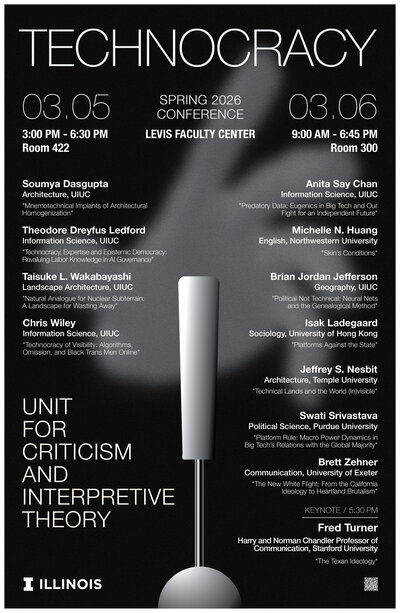
March 5 & 6, 2026

As the technocratic class extends its grip over governance, with ever increasing power held in the hands of the CEOs of Google, Microsoft, Apple, Amazon, and X, biopolitics and the alliance with militarization have become central mechanisms for controlling human society and shaping the future. Both the product of and the means of state control, the technocratic visions of a technologically elite class increasingly dictate crisis management, citizenship, and the terms of life. In light of this, the symposium will examine how technocracy consolidates power through technological, political, and economic infrastructures; technology’s claims to neutrality and efficiency; and the possibility of an entirely new elite tier of class structure that is intelligent and technical but not human. Bringing together scholars working at the intersections of technology, power, and governance, this symposium will explore the stakes of technocratic decision-making across multiple domains with a particular focus on the how these are manifested in the present political moment.
Program:
March 5, 2026 / Levis 422
03:00 PM: Introduction – D. Fairchild Ruggles
03:10 PM: Soumya Dasgupta (Architecture, UIUC), "Mnemotechnical Implants of Architectural Homogenization"
03:45 PM: Taisuke L. Wakabayashi (Landscape Architecture, UIUC), "Natural Analogue for Nuclear Subterrain: A Landscape for Wasting Away"
04:20 PM: Chris Wiley (Information Science, UIUC), "Technocracy of Visibility: Algorithms, Omission, and Black Trans Men Online"
05:00 PM: Theodore Dreyfus Ledford (Information Science), "Technocracy, Expertise and Epistemic Democracy: Revaluing Labor Knowledge in AI Governance"
05:35 PM: Discussion
06:05 PM: Closing – Brett Zehner (Communication, University of Exeter)
March 6, 2026 / Levis 300
09:00 AM: Welcome - Kevin Hamilton (Associate Vice Chancellor for Research & Innovation)
09: 10 AM: Introduction - D. Fairchild Ruggles
09:15 AM: Michelle N. Huang (English, Northwestern University), “Skin’s Conditions: On Beauty Horror and Biopolitics,” introduced by John Levi Barnard (English, UIUC)
10:15 AM: Brian Jordan Jefferson (Geography, UIUC), “Political Not Technical: Neural Nets and the Genealogical Method”
11:15 AM: Jeffrey S. Nesbit (Architecture, Temple University), “Technical Lands and the World (In)visible,” introduced by David Isern (Architecture, UIUC)
12:15 PM: Anita Say Chan (Information Science, UIUC), “Predatory Data: Eugenics in Big Tech and Our Fight for an Independent Future,” introduced by Laila Hussein Moustafa (Information Science/Middle East and North African Studies, UIUC)
01: 15 PM: Break
02:00 PM: Swati Srivastava (Political Science, Purdue University), “Platform Rule: Macro Power Dynamics in Big Tech’s Relations with the Global Majority,” introduced by Ned O’Gorman (Communication, UIUC)
03:00 PM: Isak Ladegaard (Sociology, University of Hong Kong), "Platforms Against the State"
04:00 PM: Brett Zehner (Communication, University of Exeter), “The New White Flight: From the California Ideology to Heartland Brutalism,” introduced by Amanda Ciafone (Media and Cinema Studies, UIUC)
05:00 PM: Break
05:30 PM: Keynote Lecture, Fred Turner (Harry and Norman Chandler Professor of Communication, Stanford University), “The Texan Ideology,” introduced by Taisuke L. Wakabayashi (Landscape Architecture, UIUC)
06:45 PM: Reception